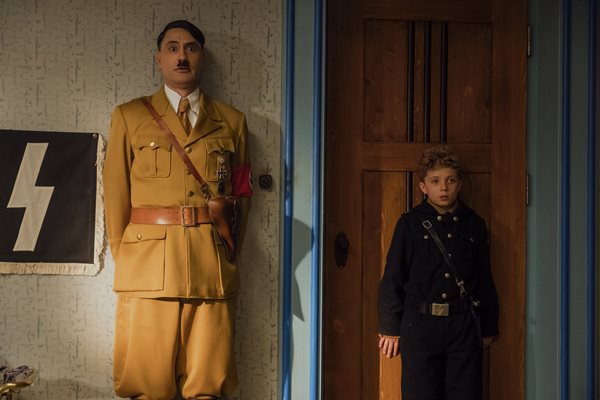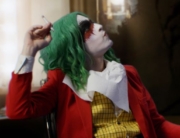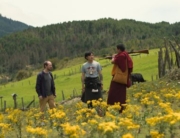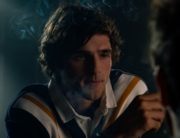
Movies about Nazis or the Holocaust generally give viewers pause, and when the film is a comedy, that goes double. One of the worst atrocities of the 20th century is difficult to fictionalize because everyone has strong feelings about how it is to be portrayed. Even though Life Is Beautiful won Oscars, it has been accused of perverse sentimentality. Even Schindler’s List had its detractors in regard to its depictions of Nazi atrocities. Any portrayal of a Nazi, even current National Socialists, that depict a character as anything but a monster is met with howls of protest. A recent article about a white supremacist that ran in The New York Times received a visceral backlash, because it seeminly depicted a young white supremacist as a normal young man, who also happens to have a loving wife, bakes muffins, and is a fan of Seinfeld.
So along comes Jojo Rabbit, co-written, directed by, and starring New Zealander Taika Waititi, who happens to be half-Jewish. His film concentrates on the German experience toward the end of World War II, more specifically on a 10-year-old boy, Johannes Betzer (a pitch-perfect Roman Griffin Davis).
As the film begins, Johannes is about to spend a weekend at a Hilter Youth camp, and he is thrilled. Also, he has, like many children, an invisible friend: Hitler himself (played by Waititi). This Hitler is by turns buffoonish, needy, sly, and absolutely anti-Semitic. He pops up when Johannes is confused or under stress and generally gives him terrible advice.
Johannes’s father has been away for two years, and his sister is dead (we are never told the reason), leaving his mother, Rosie (Scarlett Johansson), as his only immediate relative. So Johannes is going through some serious psychological trauma. National Socialism, though, gives him a purpose. Fascinatingly, he is more fanatical than most everyone else.
Because of an accident at the camp, Johannes gets injured, and so he gets reassigned to the war effort in town, as does Captain Klezendrof (Sam Rockwell), his youth camp instructor, who is already humiliated as he is unable to fight in the war because he’s blind in one eye. Johannes also learns a secret that throws this adamant Hitler fanboy for a loop: his mom is hiding a Jewish girl in the attic. The teenager, Elsa (Thomasin McKenzie), is first fearful of Johannes ratting her out, but eventually a relationship blooms where she almost becomes a surrogate sister to Johannes.
Yes, Jojo Rabbit is funny (at times very, very funny) and a bit twee and bright-toned, considering the subject matter, but it makes a point about the directions reacting to trauma can take. It’s not stated directly, but it’s obvious that Johannes’s imaginary Hitler and fanaticism took form at the loss of his father and sister. This is what the film is about. People experience trauma, feel dislocated, and cults and ideologists sneak in through the cracks.
This is Johannes film, and most of the other characters work as prompts toward Johannes’s transformation, but Waititi (and his actors) manage to give them life, and then some. Rockwell is simply fantastic as the jaded, sardonic solder who becomes a father figure to Johannes; Johansson provides ballast and a moral center, the symbol for humanism; and McKenzie (Leave No Trace) is a revelation. McKenzie’s Elsa is fierce, brave, and also mournful. You can see the sadness in her defiance and then the defiance in her love, of the sisterly sort, for Johannes. She’s the character that is the easiest to fall into the trap of a trope or convenient plot device, yet McKenzie easily sidesteps these issues with a clear-eyed, committed performance.
This movie could have gone all wrong, but Waititi guides the film through a variety of tonal changes that would have had other directors banging their heads against wall. He manages to maneuver through slapstick, sentimentality, comedy, and searing drama with the aplomb and precision of a ballerina.
Waititi, as Hitler, is, as I said, part-buffoon, part-peer, part-authority figure. As Johannes begins to rely on him less, he becomes more blustery, and as he realizes he’s being replaced in Johannes’s affection by a Jew, actually dangerous as he still has some influence over the boy. One moment when he goes full Fuhrer on Johannes is genuinely frightening.
The movie is wise, audacious, funny, heartbreaking, and ultimately hopeful. You’ll be hard pressed to find another film this year that takes bigger risks and reaps bigger rewards than Jojo Rabbit.






Leave A Comment